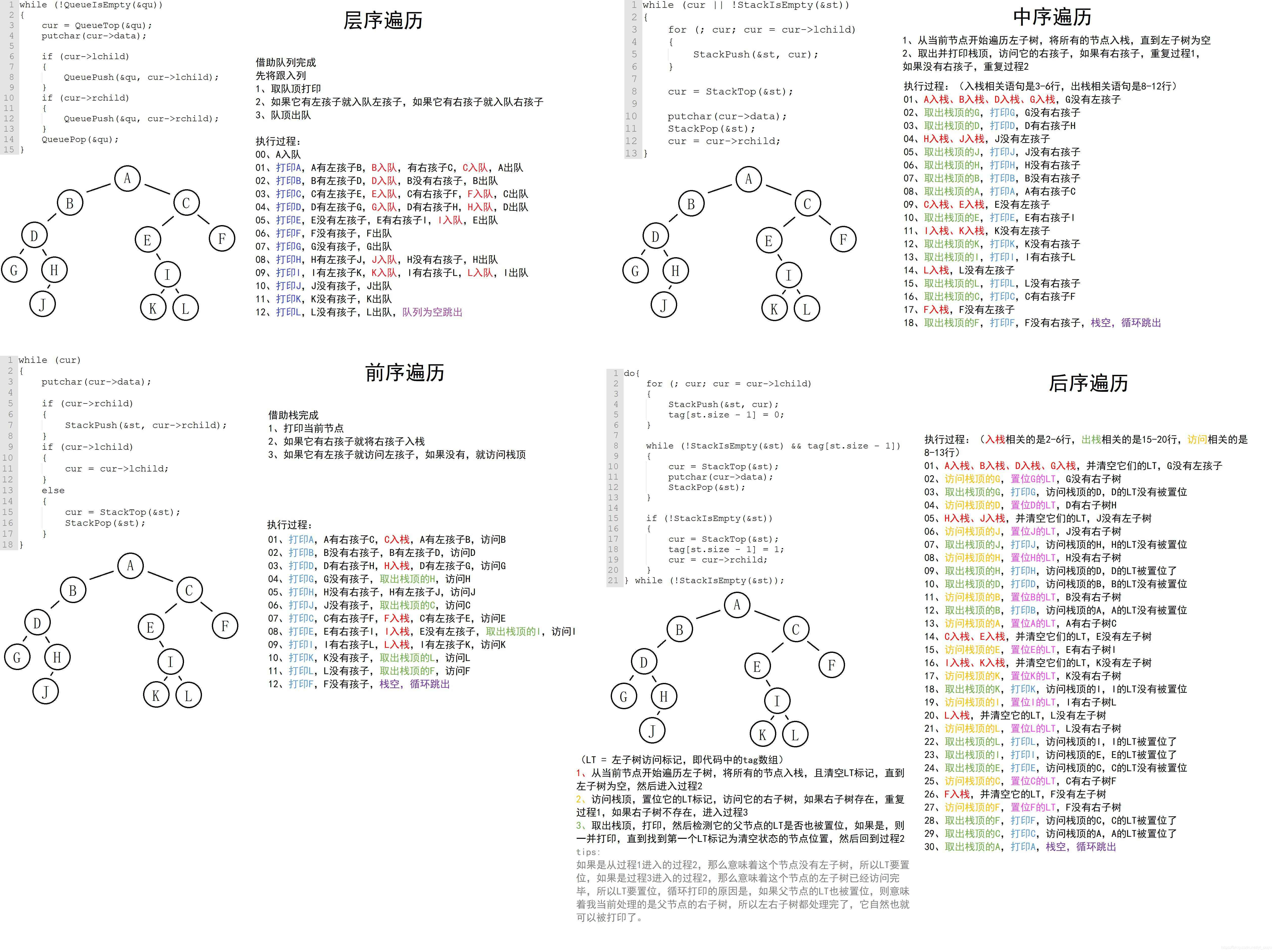
#pragma once
#include <stack>
#include <queue>
namespace yl {
template < class T >
class TreeNode
{
T m_val;
TreeNode<T> * m_left;
TreeNode<T> * m_right;
public:
TreeNode(const T &val) :
m_val(val)
{
}
template <class T>
friend class Tree;
};
template <class T>
class Tree
{
TreeNode<T> * m_root;
static TreeNode<T> * maketree(const T * val, const T & end, int &i)
{
if (val[i] == end)
{
i++;
return nullptr;
}
TreeNode<T> * root = new TreeNode<T>(val[i]);
i++;
root->m_left = maketree(val, end, i);
root->m_right = maketree(val, end, i);
return root;
}
public:
Tree() :
m_root(nullptr)
{
}
Tree(const T * val, const T & end)
{
int i = 0;
m_root = maketree(val, end, i);
}
void pre_order()
{
TreeNode<T> * cur = m_root;
stack<TreeNode<T> *> st;
while (cur)
{
cout << cur->m_val << ' ';
if (cur->m_right)
{
st.push(cur->m_right);
}
if (cur->m_left)
{
cur = cur->m_left;
}
else
{
if (st.empty())
{
cur = nullptr;
}
else
{
cur = st.top();
st.pop();
}
}
}
}
void in_order()
{
TreeNode<T> * cur = m_root;
stack<TreeNode<T> *> st;
while (cur || !st.empty())
{
for (; cur; cur = cur->m_left)
{
st.push(cur);
}
if (!st.empty())
{
cur = st.top();
st.pop();
cout << cur->m_val << ' ';
cur = cur->m_right;
}
}
}
void post_order()
{
TreeNode<T> * cur = m_root;
stack<TreeNode<T> *> st;
stack<bool> tag;
while (cur || !st.empty())
{
for (; cur; cur = cur->m_left)
{
st.push(cur);
tag.push(false);
}
while (!st.empty() && tag.top())
{
cur = st.top();
cout << cur->m_val << ' ';
st.pop();
tag.pop();
cur = nullptr;
}
if (!st.empty())
{
tag.top() = true;
cur = st.top();
cur = cur->m_right;
}
}
}
TreeNode<T> * lowestCommonAncestor(TreeNode<T> * p, TreeNode<T> * q)
{
TreeNode<T> * cur = m_root;
stack<TreeNode<T> *> st;
stack<bool> tag;
stack<TreeNode<T> *> res1;
stack<TreeNode<T> *> res2;
while (cur || !st.empty())
{
for (; cur; cur = cur->m_left)
{
st.push(cur);
tag.push(false);
}
while (!st.empty() && tag.top())
{
cur = st.top();
if (cur == p || cur == q)
{
if (res1.empty())
{
res1 = st;
}
else
{
res2 = st;
}
}
st.pop();
tag.pop();
cur = nullptr;
}
if (!st.empty())
{
tag.top() = true;
cur = st.top();
cur = cur->m_right;
}
}
if (res1.size() < res2.size())
{
swap(res1, res2);
}
int i = res1.size() - res2.size();
for (; i > 0; i--)
{
res1.pop();
}
while (res1.top() != res2.top())
{
res1.pop();
res2.pop();
}
return res1.top();
}
TreeNode<T> * lowestCommonAncestori(TreeNode<T> * p, TreeNode<T> * q)
{
TreeNode<T> * cur = m_root;
stack<TreeNode<T> *> st;
TreeNode<T> * tmp = nullptr;
size_t stsize = 0;
while (cur || !st.empty())
{
for (; cur; cur = cur->m_left)
{
st.push(cur);
}
if (!st.empty())
{
cur = st.top();
if (stsize > st.size())
{
tmp = cur;
stsize = st.size();
}
if (cur == p || cur == q)
{
if (!tmp)
{
tmp = cur;
stsize = st.size();
}
else
{
return tmp;
}
}
st.pop();
cur = cur->m_right;
}
}
return nullptr;
}
void test()
{
TreeNode<T> * t = lowestCommonAncestori(m_root->m_right->m_left->m_right, m_root->m_right);
cout << t->m_val;
}
void level_order()
{
queue<TreeNode<T> *> qu;
TreeNode<T> * tmp;
qu.push(m_root);
while (!qu.empty())
{
tmp = qu.front();
cout << tmp->m_val << ' ';
qu.pop();
if (tmp->m_left)
{
qu.push(tmp->m_left);
}
if (tmp->m_right)
{
qu.push(tmp->m_right);
}
}
}
void everyline_level_order()
{
queue<TreeNode<T> *> qu;
TreeNode<T> * tmp;
int length = 1;
qu.push(m_root);
while (!qu.empty())
{
for (int i = 0; i < length; i++)
{
tmp = qu.front();
cout << tmp->m_val << ' ';
qu.pop();
if (tmp->m_left)
{
qu.push(tmp->m_left);
}
if (tmp->m_right)
{
qu.push(tmp->m_right);
}
}
cout << endl;
length = qu.size();
}
}
void max_level_order()
{
queue<TreeNode<T> *> qu;
TreeNode<T> * tmp;
int length = 1;
T max;
qu.push(m_root);
while (!qu.empty())
{
max = qu.front()->m_val;
for (int i = 0; i < length; i++)
{
tmp = qu.front();
if (max < tmp->m_val)
{
max = tmp->m_val;
}
qu.pop();
if (tmp->m_left)
{
qu.push(tmp->m_left);
}
if (tmp->m_right)
{
qu.push(tmp->m_right);
}
}
cout << max << ' ';
length = qu.size();
}
}
};
};
#include <iostream>
#include <algorithm>
#include "binaryTree.h"
using namespace std;
int main()
{
int arr[] = { 5, 8, 4, 12, -1, -1, 18, 17, -1, -1, 21, -1, -1, 9, -1, 7, -1, -1, 7, 6, -1, 5, 11, -1, -1, -1, 3, 4, -1, -1, 1, 14, -1, -1, -1 };
yl::Tree<int> tr(arr, -1);
tr.max_level_order();
return 0;
}

